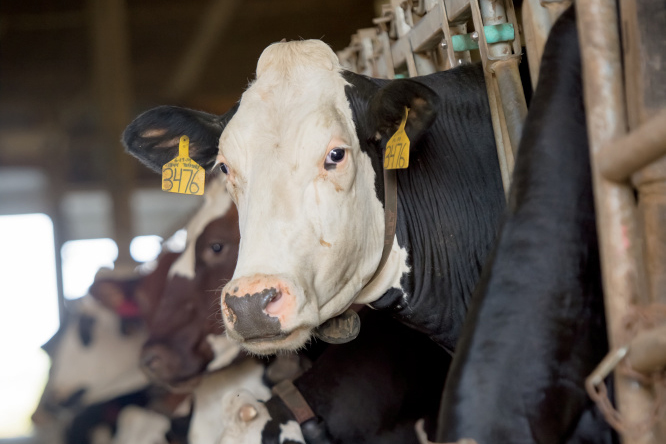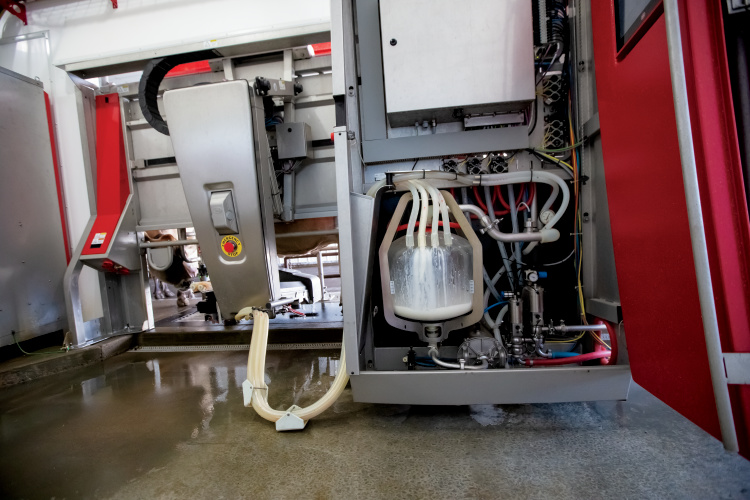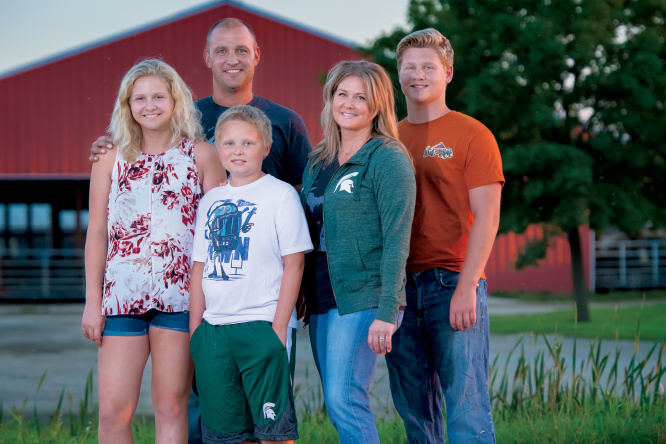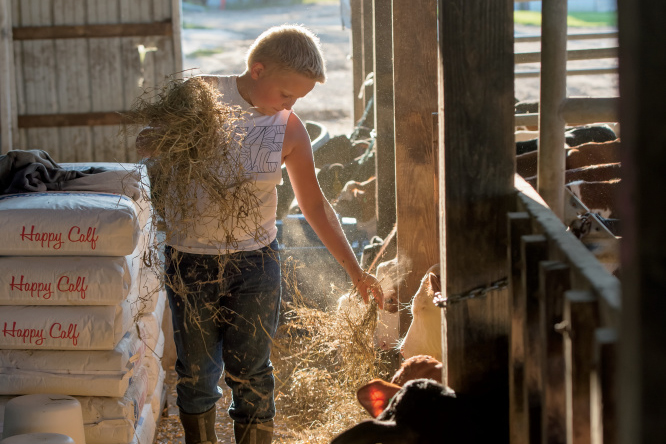Home > Michigan > Michigan Technology > How Robotic Milkers Position Michigan Dairies for Success
How Robotic Milkers Position Michigan Dairies for Success
In partnership with: Michigan Department of Agriculture & Rural Development

Have you ever seen a high-tech robot in action? It might surprise you to learn that more than 40 of Michigan’s 1,750 dairy farms now use robots to milk their cows.
Technology is critical to the success of dairy farms today. Dairy makes up the largest segment of Michigan’s food and agriculture industry, and Michigan dairy farmers are pioneers in using the latest technology, cutting-edge robotic milkers, or Automatic Milking Installations (AMIs), to produce fresh, wholesome and minimally processed milk.
Mayflower Dairy
At Mayflower Dairy in Hartford, Rudolf DeJong has 24 robotic milkers that work around the clock to milk 1,450 cows. They installed the robots in February 2018.
“Robotic milkers are like box robots, and a cow walks into the box on her own. Instead of a human prepping and milking her, a robotic arm comes around and cleans and milks her,” DeJong explains. “When she is done, she walks out of the robot and back into the barn. The good thing about robotic milkers is that it’s up to the cow when she feels like she needs to be milked. Sometimes the cows will even wait two or three in line at a robot.”

The robotic milkers not only milk the cows – they also give farmers crucial information
about every cow’s well-being. “Each cow wears a collar, similar to a Fitbit, and the robot monitors the number of steps she takes, how much she eats, her activity level, how much milk she’s giving and how much she is ruminating, or chewing cud,” DeJong says. “If we monitor all this data, we know how a cow is feeling. If a cow could talk, she might tell you she’s not eating well today. The machine has a baseline of the normal amount she eats and alerts us to any difference each day. It catches any health problems even before we could.”
While Mayflower Dairy always has two or three human workers monitoring the robots and the cows at all times, the automation of the robotic milkers have made the dairy much more efficient. They’re producing more milk with fewer people.
In an industry where skilled labor is not easy to find, the robots come as a welcome, although expensive, change for dairy operators.
“Using robotic milkers is much more expensive initially, but it pays off in cow comfort and labor savings,” DeJong says.

Prime Land Farm
At Prime Land Farm in Harbor Beach, Darrin and Barbara Siemen made the switch from a traditional milking parlor to robotic milkers in 2014. Their six robots work endlessly to milk 350 cows. In addition to the dairy, the Siemen family farms 1,500 acres of alfalfa, corn, sugarbeets and wheat, and raises 1,000 head of beef cattle.
“We bought the farm from my parents in 2013, and the milking parlor needed to be overhauled,” says Darrin Siemen, a fourth-generation farmer. “It was tired. It was hard to get reliable help. It needed change.”
When Siemen learned the software capabilities and technology available with robotic milkers, the switch was a no-brainer.
“Since we got the robots, our cows have never been treated so well and so consistently,” he says. “They get milked when they want. We don’t have to push them into a milking parlor, so there is less stress on the cattle and a calmer environment overall. The cows have more freedom.”
Prime Land Farm offers tours by appointment so visitors can see the robots work. They regularly host local kindergarten and fifth-grade classes for field trips.

Robots on the Rise
Michigan Department of Agriculture and Rural Development Senior Dairy Inspector Erin Quaine says she has seen a steady increase in the number of farms using AMIs, and the number of AMIs per farm is also increasing.
“During the past 12 months, we had two farms with 24 AMIs each start up,” Quaine says. “AMIs are the most natural and stress-free way to milk cows. Cows do whatever they want, when they want. They are never waiting in a holding pen to get milked, so that increases the time for a cow to be comfortable.”
The data gained from the AMIs not only increases the efficiency of Michigan dairies – it’s also attracting a new generation of dairymen and women who are growing up technology-minded.
Back at Mayflower Dairy, DeJong’s four high school and college-aged sons all work at the dairy, and he hopes they will one day take it over. At Prime Land Farm, Siemen’s three children are also highly involved in day-to-day operations.
“Elliott is 15, Adrienne is 13 and Riley is 9, and they can feed calves, fetch cows and drive small equipment,” Seimen says. “Our family has a passion for cattle. It’s a great way to raise a family. We’re able to teach our kids to have a good work ethic.”



